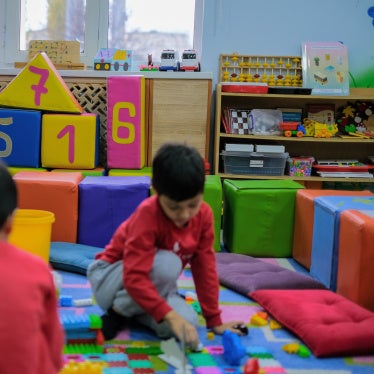(New York) -- Human Rights Watch today welcomed news that a new treaty banning the use of children in combat will take effect early next year. With New Zealand's ratification on November 12, ten countries have now ratified the treaty, which will enter into force on February 12, 2002.
"This is a huge advance in the effort to end the use of children as soldiers," said Jo Becker, children's rights advocacy director for Human Rights Watch. "A growing consensus that children are not acceptable tools of war is now backed up by binding international law."
The treaty, which is an optional protocol to the Convention on the Rights of the Child on the involvement of children in armed conflict, prohibits the participation of children under the age of eighteen in armed conflict, or their forced recruitment or conscription.
An estimated 300,000 children under the age of eighteen are currently fighting in armed conflicts in approximately 40 countries worldwide. Countries that are most affected include Angola, Burma, Colombia, the Democratic Republic of Congo, Sierra Leone, Sri Lanka, and Afghanistan, where recent reports indicate recruitment and use of children as soldiers by both the Taliban and Northern Alliance forces.
"In Colombia, government-backed paramilitaries recruit children as young as eight years old," said Becker. "In the Democratic Republic of Congo, unarmed children have been sent ahead of older troops to draw enemy fire. In Sri Lanka, they have been sent on suicide missions. In northern Uganda, kids are forced to beat to death others who try to escape. A ban on this abuse is long overdue."
Human Rights Watch is a founding member of the Coalition to Stop the Use of Child Soldiers, which was launched in 1998. As part of its campaign for a global ban on the use of children as soldiers, the coalition has organized a series of high-profile regional conferences, published research on recruitment practices in over
180 countries, and built a worldwide network of campaigns and partners in forty countries. The protocol was adopted by the United Nations General Assembly on May 25, 2000. To date, eighty-seven countries have signed the protocol. The ten countries that have ratified the protocol are Canada, Bangladesh, Sri Lanka, Andorra, Panama, Iceland, Romania, Holy See, the Democratic Republic of Congo, and New Zealand.
"These ten countries have shown real leadership," said Becker. "We urge all other governments to follow their example and ratify the protocol as soon as possible."







